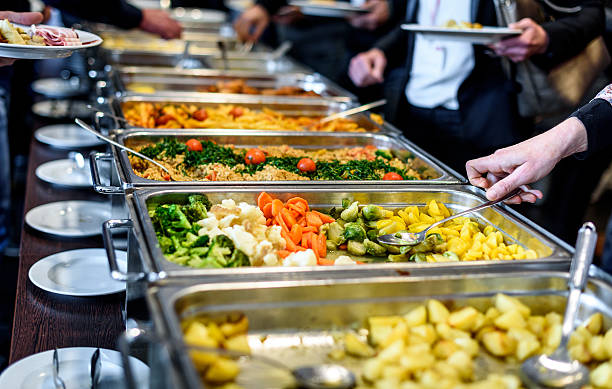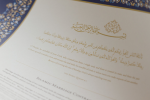Is eating in a buffet permissible?
Question: Is eating in a buffet permissible?
Considering the varying amounts which people eat, is it permissible to open a buffet despite the prohibition in contracts having ambiguity in the commodity or price?
بسم الله الرحمن الرحیم
Answer: In the name of Allah, the all Merciful, the very Merciful
Buffets are restaurants in which customers pay a fixed amount of money and then eat as much as they like. Unlike other restaurants, customers are not charged for individual dishes. Instead, they are charged per head regardless of the amount eaten.
This may seem unlawful as it entails jahālah [ambiguity] in what will be consumed. Hence, the commodity remains uncertain; and uncertainty is one of the prohibited elements in financial contracts. This is based on the hadith recorded by Imām Muslim in which the Prophet ﷺ forbade engaging in transactions which involve uncertainty.[1] Uncertainty in financial contracts materialises in several ways including ambiguity in the price or the commodity.
Imām Nawawī writes regarding this hadith:
‘The prohibition from engaging in a sale which entails uncertainty [Bayʿ al Garar] is one of the major principles in financial transactions…and countless issues are included in this. These include the sale of a runaway slave, the sale of something non-existent, the sale of something ambiguous, and the sale of that which one cannot deliver’. (al Minhāj, 10/156).[2]
However, a general principle accepted by the majority of scholars is that the uncertainty mentioned in the above ḥadīth is that level of uncertainty which may lead to dispute. The reason for the exemption is that some uncertainties cannot be avoided. Therefore, any uncertainty which either is inevitable or is minor will be tolerated.
Imām Nawawī writes:
Some uncertainty [garar] is tolerated in sales if there is a need, such as the uncertainty pertaining to the foundations of the house, and the uncertainty related to the selling of a pregnant goat, and selling a goat with milk in its udders.
Likewise, the Muslims have agreed on the permissibility of things in which there is little uncertainty, such as selling a stuffed garment, even though the stuffing cannot be seen…and they have agreed on the permissibility of leasing a house or an animal or clothes or something for the period of a [lunar] month, even though the month is at times 30 days and at times 29 days. They have also agreed on the permissibility of entering public baths [ḥammām] for a price despite people differing in the amounts of water they use, and in the time they will stay there, and they have agreed on the permissibility of drinking from a waterskin in exchange for something despite not knowing the amount that will be drank. (al Minhaj, page 1160)[3]
It is quite clear from the above that a little amount of garar and jahālah, that which is accepted in the customary practice of traders, will not invalidate the transaction.
The last two examples cited by Imām Nawawī in the text quoted above are quite relevant to the discussion on buffets; a fixed payment is made yet the amount of water consumed is unknown. In an equal analogy, the customer in the buffet pays a fixed price but the amount of food consumed is unknown. It is under this juristic characterisation that the majority of contemporary jurists permit eating at buffets.
The permissibility of eating in a buffet can be viewed from a different juristic characterisation also; the concept of ‘transfer of ownership’ [tamlīk] as opposed to the concept of ‘allowing’ [ibāḥah].
To elaborate, a contract of sale results in tamlīk; the purchaser becomes the owner of the commodity. Once the contract is concluded, all rights of the seller in relation to the sold commodity cease. Hence, the seller cannot stipulate any such condition restricting the buyer in his/her usage of that commodity. For example, the seller cannot stipulate a condition that the commodity of sale can only be used on a specific day or in a certain area.
In contrast, Ibāḥah means to make something lawful without transferring ownership. For example, when one is invited to a meal, the host merely allows the guests to consume the food; the guests do not own the food prior to consuming it. This being the case, the guests will not be permitted to invite others nor will they be permitted to take the food out of the eating venue, unless permission is given by the hosts.
At a restaurant the customer does become the owner of the food purchased. Therefore, he/she has the choice of eating at the restaurant or taking it away. Likewise, the customer has the option of feeding it to others. Once the customer has paid the price, he/she may do with that food whatever they choose. There are no restrictions.
However, none of this applies to a buffet. Although the customer has paid the fixed price, he/she cannot take the food out of the eating venue. In many buffets, if the customer is unable to finish the food in his/her plate then even that will be disposed of; the customer is not allowed to take it with them. Therefore, it appears that the payment which is made by the customer is not for the food, i.e. there is no contract of sale. The payment is only an entrance fee. Once paid, the management makes the food lawful for the ‘customer’. If this is the case then the issue of jahālah will not be considered at all. Muftī Taqī ʿUthmānī considers this to be the most apparent characterisation of this issue.[4]
And Allah knows best
Ibrāhīm ibn Muḥammad
[1] عن أبي هريرة، قال: نهى رسول الله ﷺ عن بيع الحصاة، وعن بيع الغرر. صحيح مسلم، 1513
[2] قال النووي: وأما النهي عن بيع الغرر فهو أصل عظيم من أصول كتاب البيوع ولهذا قدمه مسلم ويدخل فيه مسائل كثيرة غير منحصرة كبيع الآبق والمعدوم والمجهول وما لا يقدر على تسليمه. (المنهاج في شرح مسلم:10/156)
[3] قال النووي: وقد يحتمل بعض الغرر بيعا إذا دعت إليه حاجة كالجهل بأساس الدار وكما إذا باع الشاة الحامل والتي في ضرعها لبن فإنه يصح للبيع لأن الأساس تابع للظاهر من الدار ولأن الحاجة تدعو إليه فإنه لا يمكن رؤيته وكذا القول في حمل الشاة ولبنها وكذلك أجمع المسلمون على جواز أشياء فيها غرر حقير منها أنهم أجمعوا على صحة بيع الجبة المحشوة وإن لم ير حشوها ولو بيع حشوها بانفراده لم يجز وأجمعوا على جواز إجارة الدار والدابة والثوب ونحو ذلك شهرا مع أن الشهر قد يكون ثلاثين يوما وقد يكون تسعة وعشرين وأجمعوا على جواز دخول الحمام بالأجرة مع اختلاف الناس في استعمالهم الماء وفي قدر مكثهم وأجمعوا على جواز الشرب من السقاء بالعوض مع جهالة قدر المشروب واختلاف عادة الشاربين. انتهى.
وقال ابن رشد المالكي: الفقهاء متفقون على أن الغرر الكثير في المبيعات لا يجوز، وأن القليل يجوز (بداية المجتهد: 3/173)
وقال الزحيلي: لابد عند الفقهاء أن يكون محل العقد معلوماً علماً يمنع من النزاع؛ للنهي الوارد في السنة عن بيع الغرر وعن بيع المجهول…فلا يصح التصرف بالمجهول جهالة فاحشة: وهي التي تفضي إلى المنازعة.
ويكون العقد فاسداً عند الحنفية، باطلاً عند غير الحنفية، وتغتفر الجهالة اليسيرة، وهي التي لا تؤدي إلى المنازعة ويتسامح الناس فيها عادة (الفقه الإسلامي وأدلته: 4/534)
[4] قال شيخنا العثماني: ثم العرف في طعام البوفيه أنه يؤذن للمشتري أن يأكل ما شاء، ولكن لا يسمح له بأن يحمل منه شيئا أو أن يطعم أحدًا. فاظاهر أنه إباحة ابتداء، وتمليك انتهاء. والتليك إنما يتحقق عند الأكل، فإن أخذ شيئًا للأكل ولم يأكلها، فالحكم يتوقَّف على العرف، فما تعورف فيه أنه لا يعاد إلى الصحون، صار مِلكًا له، وإن كان ممَّا يعاد لا يملكه. انتهى. (فقه البيوع: 1/392)


